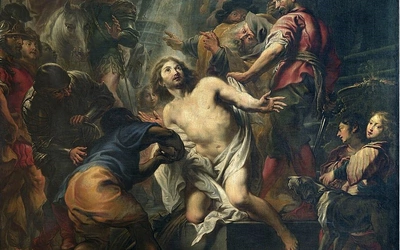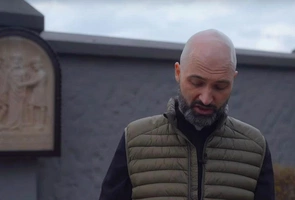In hope we are saved: Hope and the Traps of Human Suffering
Komentarz do encykliki Benedykta XVI "Spe salvi" / A commentary to the "Spe salvi" encyclical, English translation (Chapter IV)

Rev. Jerzy Lewandowski
HOPE IN SALVATION AND SALVATION IN HOPE
In hope we are saved
A Commentary on Benedict XVI's encyclical letter Spe salvi
A Collective translation reviewed and corrected by Filip Maj
Warszawa 2010
IV. Hope and the Traps of Human Suffering
The problem of human suffering elaborated by Benedict XVI in his encyclical letter Spe salvi, is multidimensional. It is an ethical problem that describes human life in aspects of the good and evil. It is a psychological problem too. Suffering is described in a new way by means of the concept of empathy, especially in phenomenological psychology, e.g. Edith Stein (later to become Saint Teresia Benedicta of the Cross) from Breslau, who was killed in Auschwitz for being Jewish. Her attitude of empathy and tragic fate is confirmed the Pope's words: To suffer with the other and for others; to suffer for the sake of truth and justice; to suffer out of love and in order to become a person who truly loves—these are fundamental elements of humanity, and to abandon them would destroy man himself (Encyclical, n° 39). Empathy requires a change from a unilevel pleasure-oriented attitude to a perspective of distress, which accompanies a love encounter.
The Polish psychiatrist Kazimierz Dąbrowski, founder of the Theory of Positive Disintegration, during World War II saved children from the Warsaw Ghetto and was one of the many witnesses and those involved in individual and collective suffering of 20th century. Seeing much suffering he wrote: We know nothing about God! We know even less about His goodness and justice. We know nothing as long as there are just monologues about Him and no dialogues with Him. Indeed, there are the saints, though few of them present us with comprehensible, sensible dialogues. There is the "Holy Bible", but most importantly, there is the miracle of Christ's existence. Yet, in this century, all that needs to be confirmed by yet another higher speech by God, one which is greater and more authentic for us. So that the voices of the concentration camps can fall silent, so that the everyday triumph of matter, the growth of evil, the everyday triumph of lies and deaths can be stopped (Dąbrowski 1980: 17).
Everyday love is heroically mysterious and requires one to courageously face challenges that will come up in the usual course of things, in every man's life, in those as well who remain in love and expect all problems to omit them. As we know, love is not something to help us avoid the adversities of life. They are an organic part of the core meaning of the word "yes" uttered in an act of love, possibly concerning each person. Therefore, Benedict XVI poses a question if we are capable of handling the heroic aspect of love, of taking upon ourselves the psychic and physical slings and arrows that love, naturally, when realized in practical rather than ideal terms, exposes us to. Realistic love requires suffering, because our decision about it is based on suffering, which has a redeeming power in love.
The question about suffering and love is an important one: Is the other important enough to warrant my becoming, on his account, a person who suffers? Does truth matter to me enough to make suffering worthwhile? Is the promise of love so great that it justifies the gift of myself? (Encyclical, n° 39). Is another person important enough for me to love him? Does love (truth) matter to me enough for it to recompense the suffering it inflicts? These questions accompany the history of man. But what is the nature of the questions of Christianity concerning man's love for man, for the world and God? A life deprived of illusions and idealism, is the thorn of suffering in any love's side. All love is grafted on a trunk of suffering. Not just a thorn, but a whole branch of human suffering grows out of the trunk of love
The discovery of the interconnections of love and suffering, as well as the heroic love dimension, is a cognitive achievement of Christianity in general. The Christian faith has shown us that truth, justice and love are not simply ideals, but enormously weighty realities (Encyclical, n° 39). It is not just about the God's model of suffering, revealed to the believers by the personal story of Christ, but also about the foundations of the entire theology and Christian anthropology. Discovering the mystery of the existential relations of love and suffering is Christianity's contribution. This statement is fully justified as well as courageous. The more so, given the accusations that the Christian vision of love and suffering is unrealistic and based on hidden procedures of violence, falsely interpreting the evangelical message of suffering (Cf. e.g. Drewermann 1996).
The criticism of practices directed at exciting oneself through suffering, carried out by some saints, is sometimes fully justified, e.g. the taxonomy of suffering by St John of the Cross (Cf. I and IV steps of the mystical experience in: John of the Cross 1986: 500-501.), or the postulate of St Theresa of Jesus: "either suffer or die" (St. Theresa of Jesus 1944: 323). Benedict XVI's presentation defies the criticism based on false, exaggerated or extreme interpretations and practices of Christian faith.
In the theological dimension, suffering refers to God, who desired to suffer for us and with us. Bernard of Clairvaux coined the marvellous expression: Impassibilis est Deus, sed non incompassibilis— "God cannot suffer, but he can suffer with" (Sermones In Cant., Serm. 26,5: PL 183, 906)- "God cannot suffer, but he can suffer with." Man is worth so much to God that he himself became man in order to suffer with man in an utterly real way—in flesh and blood—as is revealed to us in the account of Jesus's Passion (Encycical, n° 39). Through God's incarnation, made out of love for suffering man, God's suffering was merged with man's suffering, and man's suffering was merged with God's suffering.
The man-God relationship is a model of a love relationship, capable of redeeming those joined in faith, hope and love. Suffering people do not necessarily have to be left alone with their suffering and their love. The uniting of the nature of God and man (i.e. both love and suffering) in the act of incarnation brings an end to the extreme loneliness of God and man. The revival of the love relationship, grafting it into the very core of suffering, has a saving character and uplifts man over the experience of his own limitations and faults.
Suffering, in its Christian presentation, contains a dynamism of consolation (conso-latio: "in union, as one"), love and hope in God. Its visible manifestation can be found in testimonies, constituting the bases of human hope, since in our many different sufferings and trials we always need the lesser and greater hopes too—a kind visit, the healing of internal and external wounds, a favourable resolution of a crisis, and so on. In our lesser trials these kinds of hope may even be sufficient (Encycical, n° 39). The praxeology of hope in the situation of suffering is based on being together, seeing one's own being in the context of other beings as good and beautiful beings, as well as giving a unique and lasting value to individual and collective lives.
The joy of being together is the antithesis of being alone, living a mortal life, condemned to the destruction of passing moments. It involves being denied another encounter with someone who just stood in front of our eyes a moment ago and whom we could embrace and who now "is gone for good". Hope's fading is related to the fact that people disappear from our view. They made our life meaningful, even if it was a short while that they maintained our existence at the level of love.
Benedict XVI contrasts the tragedy of human hope with the tragedy of decisions we make for our own comfort. All too often comfort stands in opposition of our feeble love. Every day, while making simple choices we must put the good of love above the good of comfort. Otherwise, the obsession with comfort may turn the good of love into its opposite. This will come to be a tiresome duty, bringing boredom or revulsion towards the past object of love. Seeking comfort can block love's way, since it can at times turn out to be inconvenient, contradicted, unwanted, or evoking fear of the trace of destruction contained in love. This is the case because love is connected with the human life cycle, occurrences of fate or the ordinary human lack of knowledge, which was noticed amongst others by a great moral philosopher of ancient Europe, Socrates.
The great philosophers draw our attention to the mystery of everyday life and to great fields of human existence. Apart from them, great saints are needed, who, as witnesses of love, devote themselves to it unreservedly and ultimately, as sacrifices of a persistent love for man, the world and God. In the case of suffering out of love and in love, man discovers in himself heroic, self-sacrificing, border dimensions, which extend his knowledge of the standards of love and suffering. Some of them become martyrs of love. For them, suffering for another person, in the name of an achieved truth, freedom and love, or in the name of God, is something natural. We regard this as a testimony of extraordinary, supernatural, unique and almost superhuman deeds - also known as saintly deeds.
The exceptional people that are courageous enough to love "excessively" are people of great hope who were able to make the great journey of human existence in the way that Christ had done before them (Encyclical, n° 39). These people, whom we call "saints", surpass not only the species, but also cosmic dimensions of love. The great trials of life require ultimate resolutions, in which the truth of life and the love for another person is more important than one's own well-being, career and possessions. An enormous hope, much greater than that of everyday life's ideas, is needed for that.
It is worth remembering the deep, abandoned nowadays, spiritual practice of dedicating or offering our smaller or greater efforts, joys and worries to someone. To someone or for someone, for other people and God. This worthwhile practice should be revived so that the communion of spiritual, rather than just material or biological hope is reactivated. Actions of help for others, the ill and lonely, being taken up by charity organizations are of great importance for sustaining social love. However, what is also needed is an intense, private, intimate and sometimes anonymous practice of offering one's own spiritual and material gifts.
At times, it can be just praying for those who need encouragement, for those rejected or excluded by fate or by people's intentional actions. To help them rebuild their meaning of life. This noble form of building or rebuilding social and spiritual hope is a preventive measure being taken against suffering so that it does not expand its scope and strength within the borders of our individual and collective lives.
The language of loneliness is prayer, in which what is silent or mute regains its vibrancy, vivifying meanings that never come up outside prayer or in loneliness. There are many forms of suffering, one of which is loneliness healed by tears and deeds that help those who shed tears. Prayer and consolation (as "being in union") are saving gestures. They are signs of the love of God Himself.
In her letter to Father Gracian (1576), St Teresa of Avila wrote: Let us not imagine that he who suffers does not pray: rather does he the more offer his troubles to God; and often does such a one pray better than those do, who, all alone in their cell, strike their breasts again and again, and when they force themselves to shed a few tears, call that prayer (St Teresa 1902:129-130). It is easier to access God in solitude. Nobody is blocking and distorting Him or competing with Him. Loneliness may be a necessary experience for each person to have an equal chance of discovering God. The access to Him tends to be shut, blocked or limited.
Psychoanalytical descriptions of suffering compete with those of Christianity. Introduced at the turn of the 20th century by a Viennese doctor, Sigmund Freud and elaborated by his associates, they are popular nowadays in European and American cultures. The psychoanalytical school treats suffering as an important cultural phenomenon. Benedict XVI refers on several occasions to the views of the Frankfurt School, whose roots go back to Freudism.
According to psychoanalysts, seeking happiness has two aspects: positive (seeking delight) and negative (avoiding suffering and a lack of delight). What we call happiness in the strictest sense comes from the (preferably sudden) satisfaction of needs which have been dammed up to a high degree, and it is from its nature only possible as an episodic phenomenon (Freud 1962: 23). It is just a slight and short-lived pleasure. We delight most intensely in contrasts rather than in states of pleasure.
For man, suffering is a threat coming 1) from his body "which being destined to decay and rot, cannot avoid pain and fear...", 2) "from the outside world" and its "powerful, unrelenting, destructive forces", 3) from "one's relationships with others", which we perceive as being most overwhelming. Under the influence of such a suffering capacity, men are accustomed to moderate their claims to happiness (Freud 1962: 24). This is the source of the principle of avoiding suffering and various strategies of psychological defence, e.g. solitude and keeping away from people. We protect ourselves against the threats of the world by "turning away" from it, or by attacking and subduing it with the help of science and technology. Then one is working with all for the good of all (Freud 1962: 24-25). Protection from suffering can paradoxically take the form of an intoxication of substances that make us feel pleasure, changing the whole system of our perception of the world, without which it would become unbearable.
Ordinary conditions of mania and those of intoxication (e.g. with alcohol, drugs or medicines) bear resemblance to each other. Besides this, our normal mental life exhibits oscillations between a comparatively easy liberation of pleasure and a comparatively difficult one, parallel with which there goes a diminished or an increased receptivity to unpleasure (Freud 1962: 25). Toxic strategies are highly valued in all societies, where they are considered "saviour from worries". Due to the chemical methods of defending themselves from suffering, people can escape the pressure of reality and find themselves in their "own worlds" with enhanced experiential conditions. Bringing relief, the intoxication strategies take away the energy needed to change one's own fate. Another way of protection against suffering is satisfying drives and desires. In extreme cases, e.g. through the Eastern yoga techniques, "happiness in peace" can be reached by refraining from any activity (sacrificing life).
Similarly, the surge of perverse impulses can be satisfied. "Sublimation of drives" can also protect against suffering. One gains the most if one can sufficiently heighten the yield of pleasure from the sources of psychical and intellectual work. When that is so, fate can do little against one (Freud 1962: 26). This sublimation method of preventing suffering works most efficiently for artists, scientists, creative people and those with proper predispositions and talents, but unfortunately "it is accessible to few".
Apart from artistic and scientific activities, one can satisfy one's drives through work, because it allows the engagement of many libidinal components (narcissistic, aggressive or even erotic). As Freud wrote: And yet, as a path to happiness, work is not highly prized by men. They do not strive after it as they do after other possibilities of satisfaction (Freud 1962: 27 footnote). Sublimation fails if "the body starts to cause one to suffer". People who protect themselves from the suffering of the outside world move into the world of internal images and illusions. Here, the premium is given to the enjoyment of works of art - an enjoyment which, by the agency of the artist, is made accessible even to those who are not themselves creative. (...).Nevertheless the mild narcosis induced in us by art can do no more than bring about a transient withdrawal from the pressure of vital needs, and it is not strong enough to make us forget real misery (Freud 1962: 27-28).
Sigmund Freud considers being a "hermit", turning away from the world and not wanting to have anything to do with it, as one of the radical methods of protection from suffering. This strategy does not prove effective and a "hermit" comes to be a madman left to himself. Every man has a paranoid component, thanks to which he saves himself, making various wishes come to reality. If many people adopt the attitude based on wishes (e.g. in paranoia), a phenomenon occurs called collective madness.
The "hermit" strategy as a way of avoiding suffering seems unacceptable to Freud, since it is designed to overcome a pressure of reality that cannot be overcome and when adopted by many people, it can turn into collective madness. The religions of mankind must be classed among the mass delusions of this kind. No one, needless to say, who shares a delusion ever recognizes it as such (Freud 1962: 28). According to Freud, the only antidote to suffering is love, from which and in which we expect to find satisfaction and fulfilment in loving and being loved.
Freud pointed out that the central point of life is not suffering, but love, especially sexual love (the archetype of seeking happiness). It is that we are never so defenceless against suffering as when we love, never so helplessly unhappy as when we have lost our loved object or its love. But this does not dispose of the technique of living based on the value of love as a means to happiness. There is much more to be said about it (Freud 1962: 29). One derives happiness from the delights of "beauty" as well (e.g. "people, forms, gestures, natural things and landscapes, works of art or even science"). Beauty as a type of "aim-inhibited affection (zielgehemte Reging)" is derived, according to Freud, from a sexual sensation.
The way of realizing one's own happiness depends on our psychological type and is different for 1) "the erotic man", 2) "the self-sufficient and narcissistic man" and 3) "the man of action". The first type looks for happiness in emotional relationships with other people, the second type finds fulfilment in his inner psychic processes (sublimation of drives and multitude of objects), the third - by being active in his environment.
The sources of human suffering are: 1) nature's superiority, 2) the flaws of the human body, 3) the imperfection of the institutions that regulate interpersonal relations: a) family, b) state, and c) society. As a last technique of living, which will at least bring him substitutive satisfactions, he is offered that of a flight into neurotic illness - a flight which he usually accomplishes when he is still young. The man who sees his pursuit of happiness come to nothing in later years can still find consolation in the yield of pleasure of chronic intoxication; or he can embark on the desperate attempt at rebellion seen in a psychosis. (Freud 1962: 31). We know that neurosis and psychosis are extreme ways of coping with suffering. In order to heal them, well-organized and competent institutional actions need to be taken (e.g. medical, pedagogical, penitentiary, as well as religious).
Sigmund Freud highlighted the role of religion in the systematic soothing of collective suffering; its influence on improving the situation of suffering people has not been assessed by him in an ambivalent way. He accused religious methods of alleviating suffering something that could be considered their advantage, e.g. their influence on the "game of choice and adjustment", as well as presenting the same path of "reaching happiness and defence against suffering" to all people, on whom, as he believed, the path was "imposed".
Freud also believed that the religious defence against suffering is not appropriate, since it decreases the value of human life and distorts the image of the real world in a "delusional" way (by "terrorizing the intellectualists"). It "powerfully" consolidates "psychic infantilism" and drives people into "collective delusion" etc. Despite the excited tone of these statements on the drawbacks of religious ways of alleviating pain and suffering, in the end Freud kindly admits that religion succeeds in sparing many people an individual neurosis. But hardly anything more (Freud 1962: 32). However, he does not give an example of any other institution that could do "much more" to alleviate suffering! Freud aims many of his negative remarks, addressed at "religion" in general, at Judaism (Mosaism), which he criticizes a lot.
This fragment of Freud's contemplation on man's suffering in the world is summed up by a statement that out of all many ways of soothing pain, there is no one certain way, including the religious one. A supported with religion's referring to the "unfathomable Providence" as a way of finding consolation and delight in suffering, which in fact is a form of man's succumbing to his own misery. To find a relief from suffering, one simply needs to give in to what is inevitable and is partly contained in the very nature. Relief can be obtained through a change in human culture as well. Freud admits that the victory of Christian vision of fighting suffering was achieved through its opposition to the pagan vision, which accepted the naturalistic standard of treating suffering, but by alleviating one form of suffering, it can bring about other types (e.g. more sublime ones).
Although the overall Freud's assessment of the Christian way of alleviating suffering is negative, especially in the institutional and historical perspective, it is Christianity as a religion that is one of the few systems of faith, if not the only one, based on the revelation of the very nature of love in the act of God's (Jesus Christ's) suffering. Christianity shows how God merges His nature, usubmitable to suffering, with the suffering human nature. The Christian perspective does not limit itself to immanent aspects of suffering and its neutralization. It expands the question of suffering to the transcendent sphere, pointing to the ways of neutralizing it through "sacrifice". Benedict XVI emphasises that this way, both small and great endeavours of man, his small and great sufferings, encounter the co-suffering of Christ, who gives human culture the "treasury of compassion".
The various ways of overcoming suffering connect in love, the centre of human life, which is the central point of the revelation of the Christian God. Thanks to this amazing synthesis, the human being finds appeasement. Pope Benedict XVI, in all his gentleness, asks if this perspective could not be the general perspective of the meaning, thus contributing to the "economy of good and human love". He adds: Maybe we should consider whether it might be judicious to revive this practice ourselves (Encyclical, n° 40) — for us individually, for us Christians, for us suffering people.
opr. mg/mg

Polecane
-
Patron rycerzy i Wielki Męczennik. Dziś wspominamy św. Jerzego

-
Powstanie CPK oddala się. Resort „weryfikuje prognozy”

-
„Proces nie przebiega dobrze”. Komplikacje zdrowotne byłego ministra

-
Bp Ważny: wiernym w Sosnowcu chciałbym powiedzieć „Pokój wam”

-
Watykan chce odnowić porozumienie z Chinami. Układ pozwala, by komuniści wpływali na nominacje biskupów

Najnowsze
-
1 W drodze do domu czy zamknięci w doczesności?
-
2 Patron rycerzy i Wielki Męczennik. Dziś wspominamy św. Jerzego
-
3 Powstanie CPK oddala się. Resort „weryfikuje prognozy”
-
4 „Proces nie przebiega dobrze”. Komplikacje zdrowotne byłego ministra
-
5 Bp Ważny: wiernym w Sosnowcu chciałbym powiedzieć „Pokój wam”
-
6 Watykan chce odnowić porozumienie z Chinami. Układ pozwala, by komuniści wpływali na nominacje biskupów
-
7 Być ewangelistą
-
8 „Naruszenie prawa do obrony”. RPO interweniuje w sprawie ks. Olszewskiego
-
9 Ponad 500 uratowanych dzieci. To bilans tegorocznej akcji 40 Dni dla Życia
-
10 Praca Opiekunki w Niemczech: Wyzwanie Pełne Satysfakcji
Najpopularniejsze
- Na podstawie Ewangelii
- Po śladach miłości
- Blok gazowo-parowy w Rybniku z decyzją o pozwoleniu na budowę
- Praca Opiekunki w Niemczech: Wyzwanie Pełne Satysfakcji
- Ekspercki raport PAP – jak dwie dekady członkostwa w UE przeobraziły Polskę
- Być ewangelistą
- W drodze do domu czy zamknięci w doczesności?
- Do godz. 17:00 głosował co trzeci Polak. Lokale wyborcze będą otwarte do godz. 21:00
- Bacowie rozpoczęli sezon u Gaździny Podhala. Owce muszą poczekać na cieplejszą pogodę
- W Chorzowie na mecz ligowy przyszło 50 tys. kibiców. To rekord XXI w.
-
Watykan chce odnowić porozumienie z Chinami. Układ pozwala, by komuniści wpływali na nominacje biskupów Stolica Apostolska zamierza jesienią bieżącego roku odnowić umowę z komunistycznymi Chinami o nominacji biskupów – odpowiedział na pytanie portalu LifeSiteNews kardynał Pietro Parolin. Emerytowany biskup Hongkongu kardynał Joseph Zen Ze-kiun nazwał tę umowę „niewiarygodną zdradą”.

-
„Naruszenie prawa do obrony”. RPO interweniuje w sprawie ks. Olszewskiego Zażalenie na areszt powinno być rozpatrzone „niezwłocznie”. W przypadku szefa Fundacji Profeto termin wyznaczono na 30 kwietnia. To blisko 4 tygodnie od chwili aresztowania.

-
Ponad 500 uratowanych dzieci. To bilans tegorocznej akcji 40 Dni dla Życia Odnotowano także kilka nawróceń i zamknięcie sześciu przychodni aborcyjnych. Kampania 40 Dni dla Życia odbywa się dwa razy w roku od 2007 r.

-
Oddolna inicjatywa odgórnie narzucana. Komisja Europejska chce finansować aborcje KE nie stanowi prawa dotyczącego aborcji. Chce jednak wesprzeć branże aborcyjną finansowo. Pretekstem ma być inicjatywa, którą w Polsce realizuje Strajk Kobiet Marty Lempart.






















